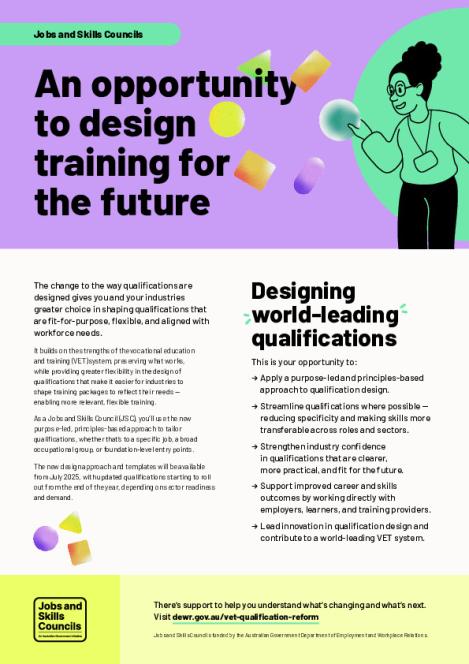Australia’s Skills Ministers have identified the opportunity to reshape Australia’s qualifications system to better support users of vocational education and training (VET) and their diverse needs.
The Department of Employment and Workforce Relations (DEWR) has published a series of fact sheets on their Qualification Reform webpage to assist all stakeholders to navigate the transition to the new VET qualification design approach.
A revised Training Package Organising Framework (TPOF), including new templates and updated processes, is also available to support this transition
The updated model is designed to improve quality, reduce complexity and provide opportunities for new and adaptable approaches to qualifications, representing a shift away from a one size fits all approach to qualification design.
To understand the changes and their impacts, stakeholders are encouraged to continue engaging with Jobs and Skills Councils (JSCs). As one of ten JSCs, Skills Insight has been working to test and participate in Qualification Reform and will continue to support our stakeholders through the process.
The transition to the new purpose-led approach will happen in stages to allow industries to adjust at their own pace:
Download DEWR’s factsheets

Our approach
Skills Insight will continue to consult with our stakeholders as we always have to consider how training package products can best meet their needs.
Following the recommended phased approach, we are preparing an implementation and transition plan to guide updates to training packages within our remit so they meet the new TPOF and template requirements. Where possible, these updates will be aligned with other relevant concurrent activities to minimise the overall impact on stakeholders.
JSCs are responsible for:
- Ensuring qualifications serve a clear purpose — occupation-specific, industry-focused, or foundational learning.
- Applying the revised TPOF — which outlines how qualifications should be designed and developed.
- Engaging with industry stakeholders to ensure qualifications reflect real job requirements and evolving workforce needs.
- Eliminating unnecessary duplication in products across training packages.
We understand that many of the industry training packages we work with face unique challenges, including:
- a large proportion of the workforce located in rural, regional and remote Australia
- no defined apprenticeship pathways or defined occupations
- low enrolments and/or lack of delivery options.
Qualification reform provides an opportunity to consider how these factors might be better supported by the national training packages. We are committed to making sure these factors are considered in how the new framework is implemented.
Background
In 2024, the Qualification Reform Design Group asked Jobs and Skills Councils (JSCs) to ‘be a co-designer and co-owner of reform as well as the main driver of implementation’. Read more about our previous work
Qualification reform-aligned approaches will be incorporated into the Veterinary Nursing Review project, which is currently underway.
Subscribe for updates
If you would like to receive updates about this work, please subscribe to our newsletter and select ‘General News’ as one of your industries of interest.